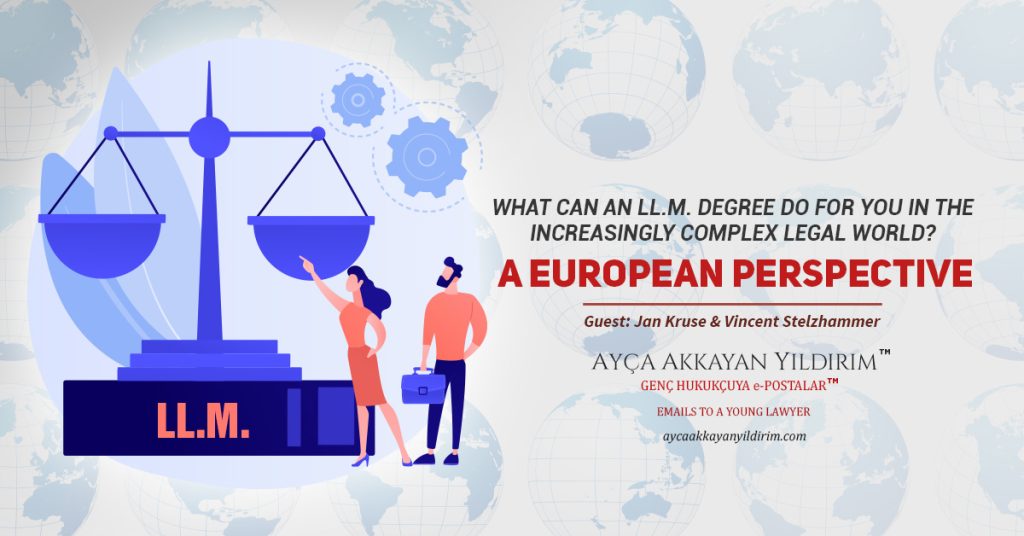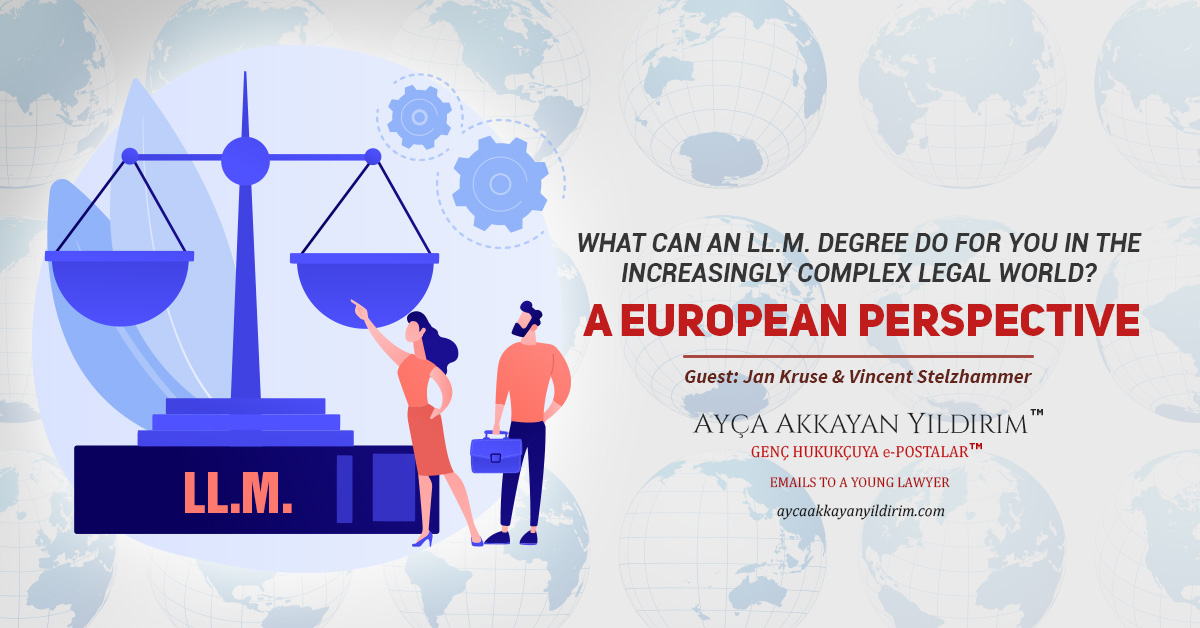Tuesday, May 11, 2021


Date : May 11, 2021
To : Young Lawyers
Re : WHAT CAN AN LL.M. DEGREE DO FOR YOU IN THE INCREASINGLY COMPLEX LEGAL WORLD?: A EUROPEAN PERSPECTIVE
INTERNATIONAL LL.M. PROGRAMS: UNIVERSITY of COLOGNE FACULTY of LAW, COLOGNE, GERMANY
I would like to express my gratitude and appreciation to Dr. Jan Kruse, Head of the Center for International Relations, and Vincent Stelzhammer, Research Associate at the Center for International Relations, for taking the time to answer my questions. GHK
GHK: Mr. Stelzhammer, as one of the largest and prominent universities in Germany, the Cologne Faculty of Law offers many LL.M. programs, including LL.M. for lawyers with a foreign law degree and German and Turkish Business Law LL.M. program. What do you think is the value of an international LL.M. from Germany from the viewpoint of a graduating law student or lawyer from Turkey?
VS: The aim of our international LL.M. program is to introduce German law to international students who have already successfully completed legal studies. An international LL.M. from Germany has many advantages.
First of all, lawyers will be able to advise clients with interests in the inside and the outside of Turkey across different legal systems. With Civil Law prevailing both in Turkey and Germany, LL.M. graduates will be experts in this field and have impressions on the different ways of practicing law within these systems.
Furthermore, an LL.M. degree from Germany will provide our international students with profound German skills allowing to reduce communication difficulties when interacting with their future German clients.
In addition, the LL.M. program offers a variety of modules in specialized areas such as air and space law, for which the University of Cologne is known throughout Europe. The future lawyers will have acquired knowledge in specific areas of law and will be able to stand out in a positive way.
GHK: At the Cologne Faculty of Law, do international LL.M. students take courses offered to students pursuing a degree in law in Germany (first exam) alongside them in classes, or are courses offered exclusively to international LL.M. students?
VS: The vast majority of lectures are held mixed with German students to promote engagements between domestic and foreign students. There are also a few courses, e.g., language courses, that are designed for our international students.
GHK: I understand that applicants with a foreign law degree must demonstrate German proficiency by taking a language test. For those looking for an LL.M. program in Europe taught in English, are there any LL.M. programs taught or courses offered in English at the Cologne Faculty of Law?
VS: As you have already noticed, most of the lectures are in German. This is because a master’s degree in the German legal system is to be achieved and therefore using the German language is a requirement. However, there are some special lectures, such as US Law, which are held in English. These lectures can be chosen in the corresponding elective module. We also offer a new English-language Master’s programme (LL.M.), which is particularly aimed at students from all over the world. This is a two-semester programme with only 25 students per year.
GHK: Could you please explain the weight or emphasis given to each part of a student’s application, such as GPA, language score, a letter of motivation, and letters of recommendation? How should an applicant from Turkey address a low GPA in an LL.M. application to the Cologne Faculty of Law?
VS: We create an overall picture from all the application documents. Of course, an applicant’s home university degree and grade will be one of the most important factors of evaluation. The grade is weighted in light of best selection. This means that we compare grades from different countries and universities and put them into context. For example, in German law studies, nine points out of a total of eighteen are already a very considerable overall mark. In other countries, this score can be comparatively lower or higher.
The second factor we look for in applications is presenting interesting extracurricular activities and professional experiences. This could be e.g., a volunteering activity, internships, or other professional experience. This could be a way for applicants to compensate a lower GPA and gives a more well-rounded view on the applicant.
In addition, a German language course (DSH) must have been passed with the minimum grade. High scores and good language skills are also well regarded, as these are quite important for the students.
For us, a letter of recommendation is not a necessary application document and is therefore irrelevant.
GHK: What do you look for in a letter of motivation? Can you offer applicants from Turkey any advice regarding writing the letter of motivation?
VS: It is important to us that we create a (positive) impression of the personality of each student and get to know their motivations and aims to achieve an LL.M. degree at our university. We want to know why the students are interested in this field of study and why they are a good candidate for our program. Moreover, we are interested in how the student envisions his/her future career and why he/she thinks that an LL.M. degree is important for his/her aims.
GHK: It is a widespread understanding that German state universities do not charge any tuition fees. Is tuition fee-free for the LL.M. programs in the Cologne Faculty of Law for international students, including a non-Europeans applicant from Turkey? What are the other fees such as administrative costs, semester ticket costs, and the like that international students must pay for?
VS: Every student at the University of Cologne has to pay about 280€ each semester. This includes tuition fees, administrative costs and the semester ticket. With the semester ticket, it is possible to travel through the whole federal state of North Rhine-Westphalia for free (ICE- and IC-trains excluded). These costs are also charged to foreign students, but nothing more. The semester ticket is a great opportunity to visit the countless cities and sights!
GHK: Are scholarships available to cover living costs? Being a non-European applicant from Turkey, how would one find suitable scholarships for studying in Germany and, in particular, the Cologne Faculty of Law?
VS: Fortunately, there are a large number of scholarships that are also available for non-Europeans. For example, one can find them on the website of the German Academic Exchange Service (DAAD). You have to fill out some criteria like your nationality, your university degree or your field of studies.
There is also a scholarship called “Deutschlandstipendium” which is also for international students who aim to achieve a Master´s degree in Germany. The University of Cologne is taking part in this.
GHK: If one had an LL.M. degree from the Cologne Faculty of Law, what further steps would one have to complete to become a practicing lawyer in Germany? What are the job opportunities for a non-European in Germany or Europe who has earned an international LL.M. from the Cologne Faculty of Law?
VS: In order to become a practicing lawyer in Germany, you have to pass two state examinations.
If you have an LL.M. degree from the University of Cologne, you still have to complete normal law studies at a German state university. So, the LL.M. degree at the University of Cologne does not replace a typical German law degree. Nor is it designed to do so, but rather to allow students to specialize in a particular field on an international level. They might benefit from these studies afterwards when looking for a job that combines both their home university and their German LL.M. degree. The LL.M. is primarily an additional academic qualification that should help the graduate in his/her home country.
Generally spoken, there is the possibility to be recognized as a “European lawyer”, what entitles one to practice in Germany as a lawyer. However, this possibility is only available to students who are already admitted to the bar in a European member state.
For a non-European in Germany, the LL.M. can prepare one for academic positions in international law. Most graduates work as administrators or as research assistants in advisory or research positions in the international legal market.
GHK: Thank you for taking the time to speak with us, Mr. Stelzhammer. Dr. Kruse, any parting thoughts for applicants from Turkey considering the Cologne Faculty of Law?
JK: Cologne has a national and international reputation for the quality of its research and teaching, so many of the staff who will teach you are leaders in their professional fields, challenging you with the latest developments in your subject area. Furthermore, Cologne is a diverse, friendly and cosmopolitan place. You will be living in a merry and relaxed town, not only during the world-famous Cologne “Karneval”. We have students from more than 100 different countries, which makes it a fascinating place to be and means that you’ll make friends from all over the world!
